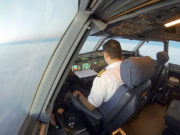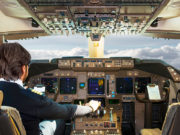In the early days of commercial flight, working as an airline pilot was dangerous. Aircraft were not the safest machines to operate, mechanical difficulties were routine, and air traffic control services were almost nonexistent.
The first commercial pilots flew using instruments that were primitive by today’s standards. They flew by the strength of their own visual acumen, depending on an intimate knowledge of their flight paths that had become ingrained through will and experience.
Since the Air Line Pilots Association, International (ALPA) was formed in 1931, the aviation community has learned certain basic principles about aviation safety. One is that the most important safety assets on any airliner — cargo or passenger — are two adequately rested, fully qualified and well-trained pilots.
Airline pilots must be able to control an aircraft in a dynamic and changing environment. We routinely perform the expected — talk with air traffic control, check the current weather and forecasts, and observe how engines and systems are performing. But airline pilots must also be able to safely manage the unexpected. Whether it’s a fire in the cargo compartment, a medical emergency or a disruptive passenger on the aircraft, the list of possible — yet unpredictable — events is nearly endless.
From the high-profile “Miracle on the Hudson” in 2009 to the Southwest Flight 1380 safe landing this April, there are many examples of how having two pilots in the cockpit makes such a tremendous safety difference. But despite these clear examples, some are attempting to remove them.
A dangerous provision was inserted into the U.S. House of Representatives Federal Aviation Administration (FAA) reauthorization bill to push for single-piloted or computer-piloted cargo operations. Section 744 of this bill would authorize a new FAA research and development program in support of single-pilot all-cargo operations. This poses significant aviation risks and undermines the safety of our airspace.
A single-pilot operation would have to accomplish all routine and unanticipated tasks unaided — like a driver in a snowstorm performing all of the following simultaneously: texting; using a global positioning system; checking the speedometer, fuel gauge, and engine temperature; taking a math test; and talking to his or her boss.
Since this dangerous provision was inserted without discussion or debate into the House FAA reauthorization bill by the Science, Space and Technology Committee, ALPA has wasted no time in pushing back against this threat to aviation safety.
In early August, the unions representing the pilots of nearly 50 commercial airlines joined together to voice their opposition and are working with elected representatives on Capitol Hill to stop this language from being included in the current Senate FAA reauthorization package.
Pilots are not alone in opposing this unacceptable provision. ALPA recently commissioned a survey, and the results clearly demonstrate that the majority of Americans “strongly oppose” legislation that would eliminate a pilot from cargo airlines. Eighty-one percent of those surveyed said they would not be comfortable on an airplane without pilots. The survey also revealed Americans’ strong support for maintaining two pilots on the flight deck, with 80 percent of respondents agreeing that two pilots working together is the best option when it comes to problem solving while operating an aircraft.
The poll results confirm that the public believes what we already know: Flying will always be safest with two fully qualified, adequately trained and well-rested pilots at the controls in the event of an emergency.
Pilots and the American public understand that air travel is the safest means of transportation, and according to the survey results, they aren’t willing to jeopardize their lives — or the lives of others — just to maybe save a buck.
As the world’s largest nongovernmental aviation safety organization, ALPA is committed to maintaining the unparalleled safety record our industry has experienced and will continue to ensure that we keep flying safe and secure for years to come. Save a buck or save a life; that’s the choice. There’s no question where ALPA stands, and there’s now no question where the American public stands either.
Capt. Tim Canoll is president of the Airline Pilots Association, International (ALPA), and a McDonnell Douglas MD-88 captain with Delta Air Lines.
Featured image: © bigmouse108 | VectorStock

